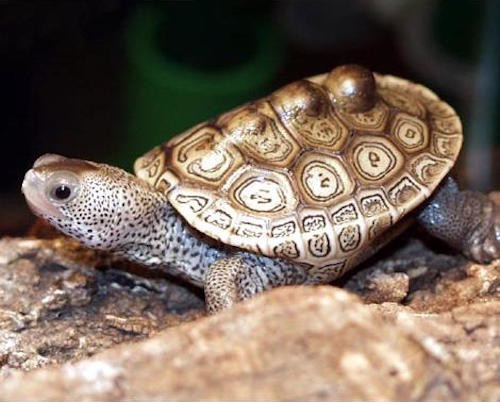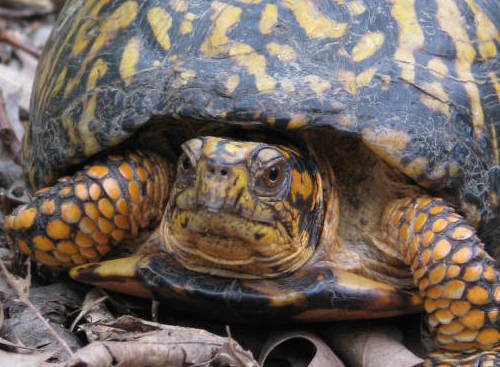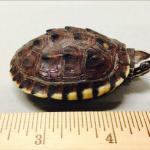
Convicted turtle trafficker Kai Xu plans to appeal the five-year prison sentence handed down to him on April 13, 2016, by a United States District Court for six counts of smuggling.
Xu has already managed to avoid the maximum punishment for his crimes, which would have been a $1.5 million fine and/or 60 years in prison ($250,000 and/or ten years for each count).
Xu organized a turtle trafficking network that moved thousands of protected turtles from the United States to China, and between the United States and Canada. He recruited Chinese-Canadian runners and brokered deals with a turtle trader in China. Although Xu was charged with just six turtle trafficking incidents, court documents describe him as “savvy with border crossings” and show that he actually crossed the border more than twenty times in 2014.
Four people arrested for turtle smuggling claimed to have been hired by Xu, including Lihua Lin, who was busted with 970 turtles in his luggage on his way to China. Lin said he responded to Xu’s ad in a Chinese-Canadian forum looking for someone to work “four days a month for $4,000”.
Landmark Case for Turtle Trafficking
Wildlife trafficking has historically been a “low risk – high reward” crime. But “the times they are a-changing”, at least in the United States. These changes for the better are the result of President Obama’s National Strategy for Combating Wildlife Trafficking, issued on February 11, 2014, and the Implementation Plan, released exactly one year later.
When Kai Xu was arrested by U.S. authorities in September 2014 for smuggling protected turtles, he and his counsel thought he could get off with a slap on the wrist. They thought he would get off with “time served” at Xu’s sentencing in April 2016. They were wrong.
This is a landmark case for turtle trafficking in the United States.
Sentences for turtle trafficking in the U.S. have been improving (see below) and the five full years for Kai Xu has established a most welcome precedent.
- Sentenced August 2015: Keith Cantore. 41 months in prison, three years of supervised release, $41,100 fine for violating attempting to purchase threatened turtles that were captured in violation of state law.
- Sentenced April 2015: Lawrence Treigle. 15 months in prison, two years of supervised release for conspiracy to smuggle wildlife out of the United States.
- Sentenced December 2014: Kwong Wa Cheung. Two months in federal prison, 2 years of supervised release, $12,000 fine for mislabeling wildlife intended for foreign commerce.
- Sentenced January 2014: Nathaniel Swanson. One year in prison and three years of supervised release for conspiracy to smuggle wildlife out of the United States.
- Sentenced August 2013: Olivia Terrance. 18 months in prison, three years of supervised release for conspiracy to smuggle wildlife out of the United States.
- Sentenced April 2012: Atsushi Yamagami. 21 months in prison, $18,403 fine for smuggling wildlife into the United States.
Xu’s arguments against his sentence are that the dollar amount of his turtle smuggling business was small and that the health risk posed to the public was minimal. Let’s take a closer look.
A Million-Dollar Turtle Trafficking Network
Xu’s international turtle trafficking operation paid off – at a minimum – in the hundreds of thousands of dollars. The U.S. government contends that the payoff was perhaps as much as $1.5 million.
In fact, once he became a full time wildlife trafficker, Xu was so confident that his fast riches would last, he dropped out of school.
According to court documents, Xu received $366,622 from his smuggling connection in China. The money went into an account in the name of Kai’s father, Hong Xu, who is supposedly “unaware of Kai’s turtle trade or the money flowing through this particular account”. Due to the fact that the full financials pertaining to this case are sealed, we cannot see if Xu had more than one bank account for his turtle trafficking business, but it would be surprising if he did not. There is also a question of whether or not Xu arranged “non-financial” transactions – Chinese-sourced turtles in exchange for the American species.
Considering the exorbitant prices paid in China for pet turtles from the U.S. and the fact that Xu was caught only six of his more than 20 border crossings in 2014, it is not at all unreasonable to presume Xu’s wildlife trafficking ring was in fact a million-dollar operation – making his $17,000 fine a pittance in comparison.
Circumventing CITES to Get Rich Quick
Turtles, even rare species, are relatively easy to purchase inexpensively here in the United States. Seven of the eleven species of confiscated turtles in the Xu case are CITES Appendix II species, which allows for regulated trade. Many turtle breeders ship internationally.

Exporting these species legally to China would have started with a six to eight week process, during which time United States CITES authorities would issue a Non-Detriment Finding (NDF) showing that the export does not pose a threat to wild populations and verify that the turtles were indeed bred in captivity. This six to eight week waiting period is not a problem for legitimate turtle breeders, who have the facilities and husbandry skills to maintain turtles until the CITES paperwork is ready and the turtles can be shipped.
But Xu was too greedy to follow the law. He deliberately circumvented CITES requirements and intentionally risked the lives of thousands of protected turtles so he could enjoy basking in his ill-gotten riches.
A Public Health Risk
Xu’s attorney argued that his client’s actions did not pose a health risk to the public. That is simply not true.
Xu’s decision to smuggle turtles in an unsanitary, unsafe, and inhumane manner posed a health risk to many people.
It is well-known that baby turtles frequently carry Salmonella without exhibiting symptoms. Although any person can get Salmonella, the risk is “highest in infants; young children; elderly people; and people with lowered natural resistance to infection because of pregnancy, cancer, HIV/AIDS, diabetes, and other diseases.” Symptoms include diarrhea, fever, stomach pain, nausea, vomiting, and headache. The infection lasts about two to seven days, and serious cases require hospitalization.
People can become infected with Salmonella without touching an infected turtle. Nearly any surface can become contaminated and transmit Salmonella to a person who touches it.
This means that if just one turtle among the thousands that Xu repackaged for smuggling was infected with Salmonella, the disease could be transmitted via any surface touched by Xu (the CDC notes that Salmonella “easily spreads” from hands to objects and surfaces).
Did employees at the UPS and Fed Ex facilities disinfect countertops, doors and other surfaces immediately after Xu’s turtle smuggling transactions? Maybe, but probably not.
How likely is it that a turtle is carrying Salmonella? “Anything that reptiles and amphibians touch should be considered possibly contaminated with Salmonella,” warns the Center for Disease Control (CDC) website.
Xu put UPS and Fed Ex employees and the public at risk for becoming infected with Salmonella each and every time he used one of the facilities to conduct his turtle trafficking business.
Trafficking Wildlife = Prison
Kai Xu did not take wildlife trafficking laws seriously. He proved himself to be a calculating criminal and deserves nothing except to serve his entire prison sentence.
Despite being arrested by Canadian authorities, Xu continued his life of crime. Three days after his infamous “turtles in the pants” smuggling incident, Xu smuggled turtles again from the U.S. to Canada on August 8, 2014, and continued to do so on at least seven different occasions until his arrest in the United States on September 24, 2014. He told his accomplice Lihua Lin – hired to smuggle 970 turtles to China in suitcases – “not to worry about it because they only look for guns and drugs. And you’re going outbound and the US does not worry about the outbound”.
No, Mr. Xu. You are wrong. Wildlife trafficking *is* something to “worry about”. And I would like to refer Mr. Xu’s legal counsel to President Obama’s Executive Order to combat wildlife trafficking in order to gain a proper understanding of the seriousness of Mr. Xu’s criminal enterprise.
The message is loud and clear: If you are trafficking wildlife in the United States, then you will got to prison.




